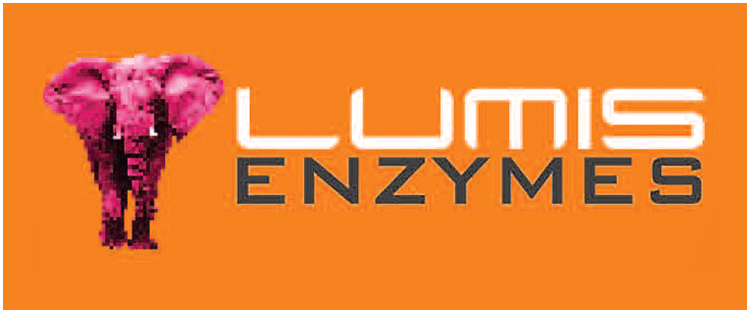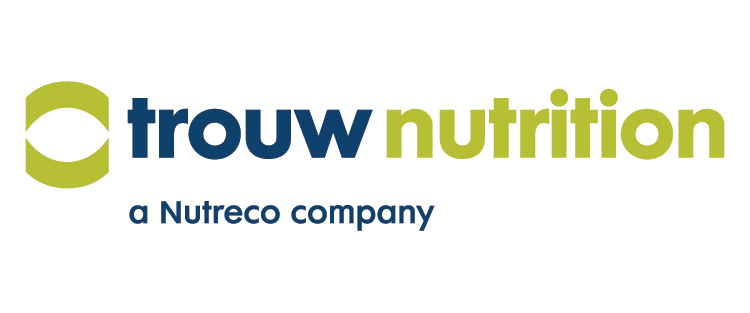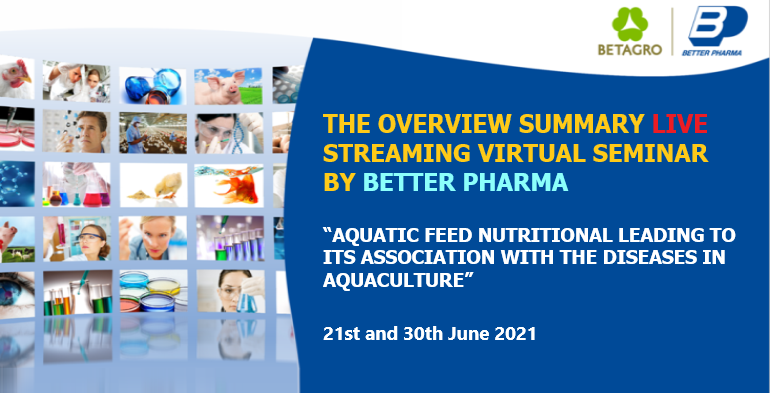
“AQUATIC FEED NUTRITIONAL LEADING TO ITS ASSOCIATION WITH THE DISEASES IN AQUACULTURE” 21ST AND 30TH JUNE 2021
Agrilife24.com:BETTER PHARMA (International Animal Health Business) together with Assoc. Prof. Orapint Jintasataporn (Ph.D.) recently, an online virtual seminar was held to suit the situation in the very important topic “Aquatic feed nutritional leading to its association with the diseases in Aquaculture”.
 There are interested parties who attended both times, including at least 4 countries, Bangladesh, Vietnam, The Philippines and Indonesia, and most of the participants were nutritionists. In this 2 times seminar, participants were given the speaker's perspectives, which can be summarized in a holistic way as follows:
There are interested parties who attended both times, including at least 4 countries, Bangladesh, Vietnam, The Philippines and Indonesia, and most of the participants were nutritionists. In this 2 times seminar, participants were given the speaker's perspectives, which can be summarized in a holistic way as follows:
KEY SUCCESS IN ANIMAL PRODUCTION ASSOCIATED TO DISEASE PROBLEM
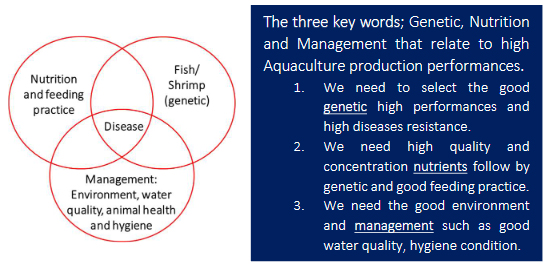
STRESS CAUSE MANY PROBLEM = INFLAMMATION
Risks associated with stress and inflammation suppress immunity then challenge to diseases infection. When the animals get stress, it will effect to;
□ Metabolic disorder
□ Gut lining breakdown then intestine get inflammation leading to “leaky gut”
□ Poor gut integrity
□ Gut health and gastric ulcers
□ Blood diverted from digestive tract to the other parts the cause a reduction of feed intake and poor overall performances
□ Heat stress
□ Suppress the immunity and disease resistance
□ Reduce reproduction and growth performances
□ Carcass and meat quality
CAUSES OF NUTRITIONAL DISORDERS
During rearing the animals especially in the intensive culture condition, nutritional disorders may arise from a variety of causes, including;
□ Deficiencies and imbalances of nutrients
□ Poor feed formulation
□ Poor feed processing: Excessive heat treatment
□ Poor feed stability
□ Poor/prolonged feed storage: Lipid oxidation or spoilage and get mycotoxins
□ Anti-nutrients and contaminants, including;
□ Toxic polyamines and amino acids: Biogenicamine
□ Oxidized polyunsaturated fatty acids
□ Heavy metal contaminants: Lead, Cd,
□ Anti-vitamin factors
□ Specific enzyme inhibitors: Trypsin inhibitor
□ Toxic glycosides
□ Toxic phenols
□ Food allergens
□ Microbial toxins: Mycotoxins
□ Specific synthetic contaminants: Pesticide residues and organochlorine compounds
□ Residues arising from ingredient/feed processing
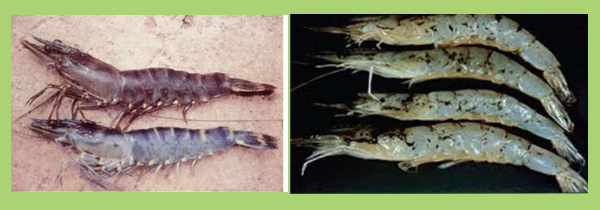
COMMON DEFICIENCY SIGNS RESULTING FROM NUTRITIONAL DISORDERS IN SHRIMP
Nutritional diseases reported for Penaeid shrimp include;
□ Ascorbic Acid Deficiency Syndrome (“Black Death Disease”)
□Cramped Muscle Syndrome
□ Chronic Soft Shell Syndrome
□ Blue Disease (Penaeus monodon)
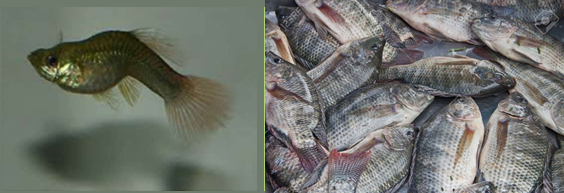
NUTRITIONAL PATHOLOGY CONDITION IN FISH
□ Bent/Curved spine
□ Cataract, White cloudy eye
□ Fin erosion
□ Fatty liver/Pale/Ceroid
□ Exophthalmia
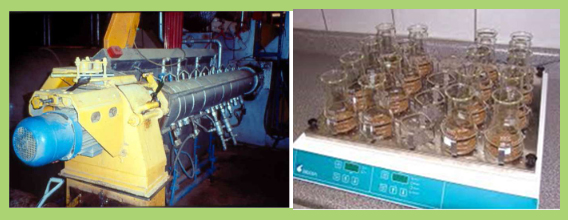
IMPORTANT FACTORS FOR EFFECTIVE AQUA FEED
□ Nutritional requirements of the animals
□ Feed waste and nutrient leasing
□ Physical apparent of feed: Require water stability (Pellet binder), percentage of fine, water absorption and hardness
□ Adequate quantities: Attachability
□ Processes at high temperature, high moisture and high pressure: Lipid oxidation, vitamin oxidation, mold, mask mycotoxins
□ Digestibility
□ Cost-effective
ADDITIVES THAT HAVE BEEN USED IN AQUA FEEDS TO ENHANCE PRODUCTION QUALITY
□ Feed Antioxidants
□ Protects feed ingredients against destructive oxidation
□ Prevent oxidation of vitamins
□ Prevent fat-soluble vitamins from dissolving
□ Prolongs the freshness and quality of feed materials
□ Mold inhibitors and preservations
□ To inhibit mold growth in feed and raw materials
□ Effect of mold contamination: Reduced mass and feed palatability, warming of raw materials, nutritional deficiencies/degradation, mycotoxins, reproduction disorder
□ Used to prevent feed deterioration (mold/bacteria inhibitors)
□ Organic acid or Acidifiers
□ Organic acids and their salts applied as feed additive
□ Protects raw materials and prevent feeds from bacterial degradation
□ Unfavorable conditions for pathogenic bacteria
□ Supports protein digestion & health condition
□ pH↓ - protein and mineral digestion ↑
□ Enhance digestive enzyme
□ Improving survival rate of Aquaculture
□ Enhance utilization of high phytate feed
□ Toxin binder
Toxin binders is material for binding or adsorbing specific mycotoxins to limit their negative effects in animal that is a well-established method for mycotoxin deactivation;
□ Binding must strongly enough
□ Prevent toxic interactions with the consuming animal
□ Prevent mycotoxin absorption across the digestive tract
□ This approach is seen as prevention rather than therapy
□ Organic minerals
Mineral is essential inorganic compounds, required in small amounts. Required for maintenance, growth, immunity, diseases resistance, survival rate and reproduction. Factors affecting more mineral requirement;
□ Stress (internal or external)
□ Environmental change
□ Poor feed quality and mycotoxins
□ Poor water quality
□ Disease challenge
□ Inorganic trace minerals are fed at higher inclusion rates due to the low bioavailability and lower absorption
□ Organic minerals more absorption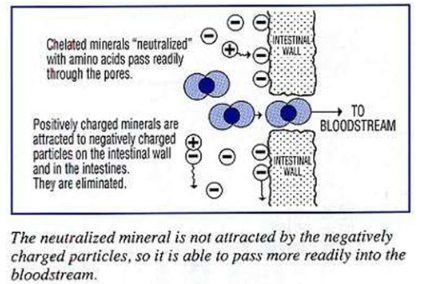
NUTRIENTS FOR OPTIMUM HEALTH AND DISEASE RESISTANCE
Nutrients and dietary components are a positive response on the health, immune response and disease resistance of finfish and crustaceans;
□ Essential amino acids: lysine, methionine, tryptophan, arginine, histidine, leucine, isoleucine
□ Nucleotides
□ Polysaccharides: peptidoglycans, beta 1,3 and 1,6 glucans, lipopolysaccharides
□ Essential fatty acids: 18:2 omega-6, 18:3 omega-3, 20:4 omega-6, 20:5 omega-3, 22:6 omega-3 depending upon species
□ Sterols and phospholipids
□ Essential minerals: P, K, Mg
□ Trace elements: Fe, Zn, Mn, Cu, Se, I
□ Vitamins: B1, B2, B6, B12, pantothenic acid, niacin, biotin, folic acid, inositol, choline, D3, A, K3, E, and C
□ Carotenoids: astaxanthin
ROBUSTNESS IS THE PROPERTY OF BEING STRONG AND HEALTHY
□ Improved genetics, nutrition and production conditions are mandatory for an efficient and sustainable production of healthy animals grown under intensive conditions
□ Essential nutrients such as protein, amino acids, essential fatty acids, vitamins and minerals are key to support animal health and decrease diseases susceptibility
□ Reduce stress will promote performances and reduction diseases problem
□ Trace minerals activate and modulate immune response
Hence, control physical of feed, balance nutrients in Aqua feed and feeding practice to get the nutrients enough for Aquaculture requirement for balance stress condition are the key success in fish and crustacean production.
ACKNOWLEDGMENT
□ DEPARTMENT OF AQUACULTURE, FACULTY OF FISHERIES, KASETSART UNIVERSITY, BANGKOK, THAILAND.
□ FACULTY OF VETERINARY MEDICINE, KASETSART UNIVERSITY, KAMPHAENGSAEN, THAILAND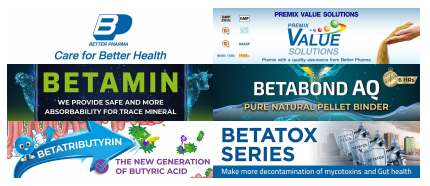
FOR MORE INFORMATIONS
PLEASE CONTACT via our Global email, Facebook and BETTER PHARMA employees of each country at any time.
Mr. Apiwat Wuttinimit
Country Sales Manager-International Animal Health Business
Better Pharma Company Limited
Betagro group, Thailand
Tel/Whatsapp : +66915518423
Mail : This email address is being protected from spambots. You need JavaScript enabled to view it. , This email address is being protected from spambots. You need JavaScript enabled to view it.






